Are you curious about the spiritual significance of Brahman cows? Many cultures worldwide have long respected and appreciated this breed for its unique qualities, including its docile nature and fertility. But beneath the surface lies a deeper meaning that goes beyond physical attributes. Brahman cows represent spiritual strength, perseverance, prosperity, and more from ancient India to modern times! In this blog post, we’ll explore the brahman spiritual meaning and uncover why they are so revered by many different cultures.
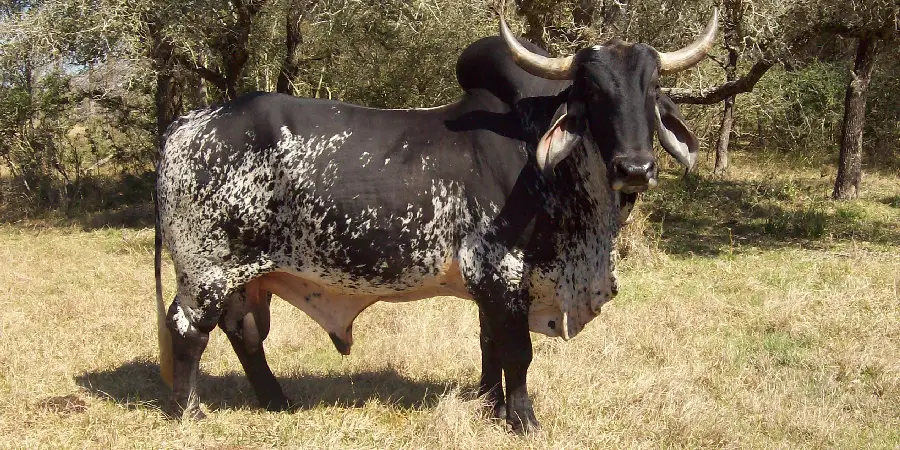
Brahman Cow Symbolism and Meaning
Brahman Cow Native American Symbolism
The Brahman cow holds a special place in Native American symbolism. Its deep connection to nature and its peaceful nature is often seen as a symbol of harmony and balance. This is no coincidence, as Native American cultures consistently believe everything in nature is interconnected and sacred.
Thus, the Brahman cow’s calm demeanor and gentle nature are revered as a symbol of the importance of living in harmony with the world around us. Whether it’s represented in art or tribal stories, this animal serves as a reminder of the spiritual significance of maintaining a healthy balance between ourselves and the natural world.
Brahman Cow Eastern Symbolism
Brahman cows have a rich and significant symbolism in Eastern culture. They are often revered as a symbol of fertility, wealth, and divine power. Their sacred status in Hinduism is attributed to the belief that they represent the epitome of compassion, purity, and non-violence.
The Brahman cow is also seen as a provider of nourishment, whether from its milk or meat. She is considered an important part of the agricultural economy in many parts of India. Beyond its practical importance, the Brahman cow has become a cultural symbol that embodies the spirituality and values of Eastern civilization. Its presence serves as a reminder of the need to honor and respect all life, no matter how humble.
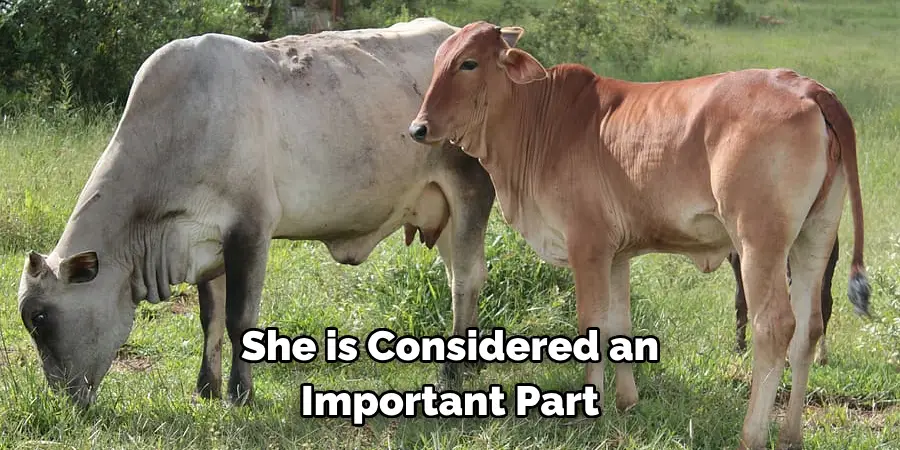
Brahman Cow Christianity Symbolism
Brahman cattle have held significant cultural and religious value in the Indian subcontinent for centuries, and their spiritual symbolism has transcended continents and religions. In recent years, Christians have adopted the Brahman cow as a representation of wisdom, gentleness, and patience – qualities that align with the teachings of Jesus Christ. The iconic hump gracing Brahman’s back symbolizes the weight of the world that the animal carries with grace and ease, as Christ did on the cross.
As a result, the Brahman cow has become a positive symbol of devotion and faith in the Christian community. Though somewhat of an unconventional icon, Brahman cattle’s tumultuous history and cultural significance make them a meaningful and unique representation of Christianity’s unwavering values.
Brahman Cow Celtic Symbolism
Brahman cows and Celtic symbolism may not seem like two things with much in common, but when you dive deeper, you’ll find some surprising connections. Brahman cows are known for their humps, which symbolize strength and resilience. Similarly, many Celtic symbols represent nature’s power and the human spirit’s endurance.
Whether it’s the trinity knot, which symbolizes interconnection and eternity, or the spiral, which represents growth and transformation, these symbols can remind us of the strength and resilience we possess within us. It’s fascinating to see how seemingly disparate things can come together meaningfully.
Brahman Cow African Symbolism
In many African cultures, the Brahman cow symbolizes strength, endurance, and resilience. Known for their hardiness and ability to thrive in difficult conditions, these cattle are highly valued by many African communities for their contributions to agriculture and daily life.
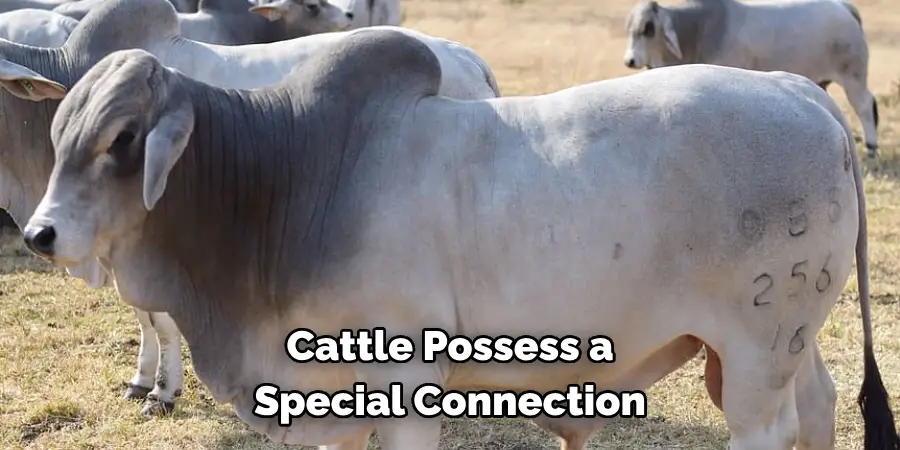
Beyond their practical uses, however, Brahman cows are also revered for their spiritual significance. Many believe these cattle possess a special connection to the divine, embodying important spiritual qualities like harmony, balance, and unity. Whether used for daily sustenance or as a symbol of deeper spiritual significance, the Brahman cow remains an important and beloved part of African culture and identity.
Brahman Spiritual Meaning
The Brahman cow is significant in Hindu religion and is considered sacred by many. This breed of cow is known for its distinctive hump, long ears, and a large dewlap. The spiritual meaning of the Brahman cow goes beyond its physical features.
They are believed to represent purity, strength, and a motherly nature. In Hindu mythology, cows were considered a symbol of wealth and often used as a currency during ancient times. They are also believed to be the vehicle of Lord Vishnu, one of the three main Hindu gods. Even today, many Hindus hold the Brahman cow in high esteem, and it is not uncommon to see these cows roaming freely around temples in India.
Brahman Cow in Dreams
The Brahman cow is a sacred Hindu creature and has long been associated with spirituality and enlightenment. Many people believe that seeing a Brahman cow in their dreams can signify a message from the divine realm. Some interpret it as a symbol of abundance and prosperity, while others view it as a sign of spiritual growth and inner transformation.
The Brahman cow’s gentle nature and peaceful demeanor make it a powerful and meaningful symbol in dream interpretation. Whether you believe in the spiritual significance of dreams or not, there is no denying that the Brahman cow holds a special place in the hearts and minds of many.
Brahman Cow Encounters and Omens
The Brahman cow is a sacred animal in Hinduism, representing wisdom, motherly love, and gentleness. In Hindu mythology, it is believed that meeting a Brahman cow on the road is an encouraging sign of good luck and prosperity. Not only are they considered a symbol of purity, but they are also known for their extraordinary intelligence and temperament.
Their presence alone is said to bring a sense of calm and tranquillity. These fascinating creatures have been a significant part of Hindu culture for centuries and continue to hold a special place in the hearts of devotees worldwide.
Brahman Cow’s Meaning in Mythology and Folklore
In Hindu mythology, the Brahman cow is a special symbol of wealth, strength, and purity. According to stories, the cow emerged from Lord Brahma’s mouth during the creation of the universe and was bestowed with divine powers. In folklore, the Brahman cow is believed to bring happiness and success to those who treat it with kindness and respect.
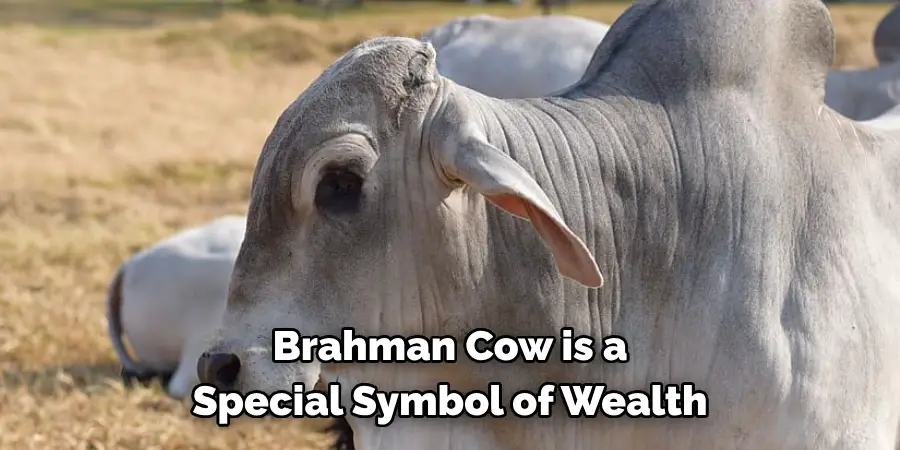
Many people revere the cow as a sacred animal and offer it food, water, and prayer. Its gentle nature and calm disposition have earned it a reputation as a harmonious creature that brings balance and stability to its surroundings. The Brahman cow’s significance in mythology and folklore represents its physical attributes and symbolizes the virtues of compassion, generosity, and love for all living beings.
Brahman Cow Totem Animal
The Brahman cow is a sacred and revered animal in Hindu culture, considered a totem animal or symbol of divinity. Its gentle nature, majestic appearance, and ability to provide essential resources such as milk and fertilizer have made it an important part of Indian spirituality and daily life for centuries.
The Brahman cow’s significance is reflected in the many myths and stories that feature it, and it has inspired countless works of art, music, and literature. Today, it holds a special place in the hearts of Hindus, who view it as a symbol of purity, strength, and prosperity.
Brahman Cow Tattoo Meaning
The Brahman cow has long been revered in Hindu culture as a divine and maternal energy symbol. It is believed to embody strength, fertility, and compassion, making it an ideal representation of the mother goddess, also known as Devi. As such, the Brahman cow has become a popular subject for tattoo enthusiasts looking to imbue their body art with deeper meaning and spiritual significance.
Whether you choose a realistic depiction of the bovine beauty or a more stylized interpretation, there is no denying the power and potency of this ancient symbol. So, if you’re looking to pay homage to Mother Earth and tap into your inner strength and nurturing qualities, a Brahman cow tattoo may be just the thing to bring you closer to the divine.
Brahman Cow Spirit Animal
Native American cultures have long believed in the power and symbolism of spirit animals. The Brahman cow originated in India and is now found worldwide. It is a particularly fascinating spirit animal.
These cows are known for their gentle and calm nature, which makes them an excellent symbol of peace and contentment. In Hinduism, the cow is sacred and represents strength and motherly love. For those who connect with the Brahman cow as their spirit animal, these qualities may manifest in their personalities and lives. The Brahman cow carries a beautiful and meaningful message that connects us to the earth and our spiritual selves.
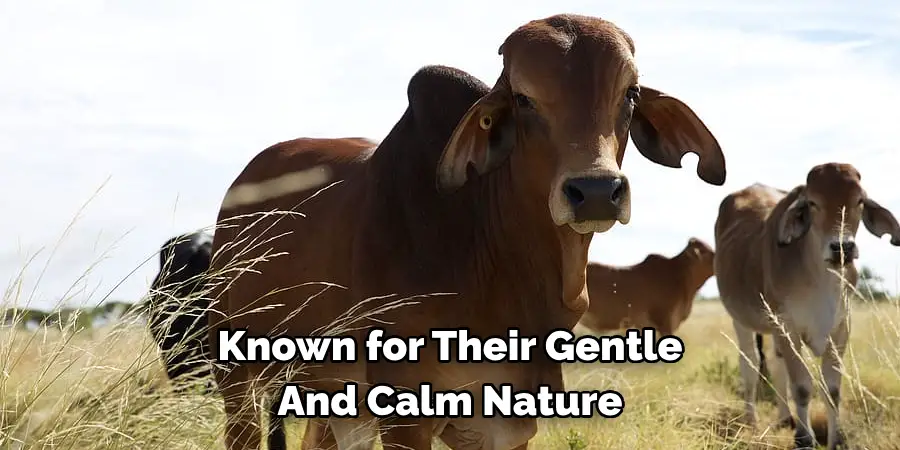
Conclusion
To conclude, the Brahman cow holds great spiritual and cultural significance, representing strength, diligence, and fertility. It encourages humans to be mindful of their actions and appreciate the power of nature around them. By having an open heart and mind to these teachings, people can enjoy a greater connection with each other and with nature.
With the coming of modern living, it is important to remember to preserve these ancient customs indicative of such high spiritual ideas. So, as you progress in your life’s journey, remember the Brahman cow – remain diligent in work, be noble in spirit, and give thanks for all your benefits. Take action today – consider exploring more about this unique breed by visiting a farm near you or doing further research – so that we can deepen our understanding of this meaningful animal. Thanks for reading our post about the brahman spiritual meaning.
You Can Check It Out to Longhorn Spiritual Meaning, Symbolism and Totem
